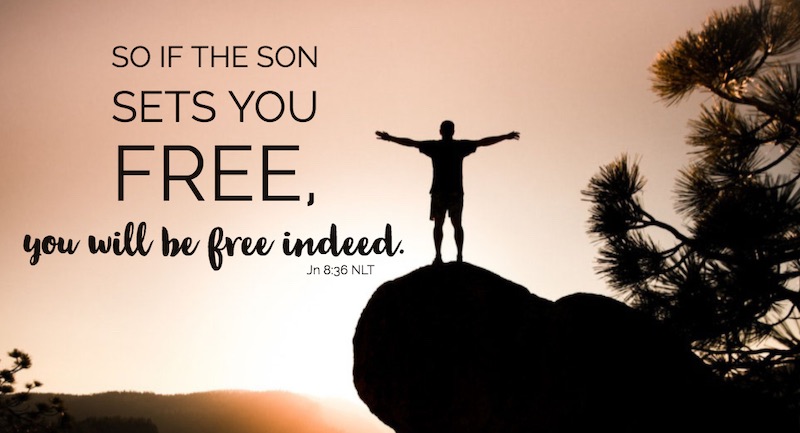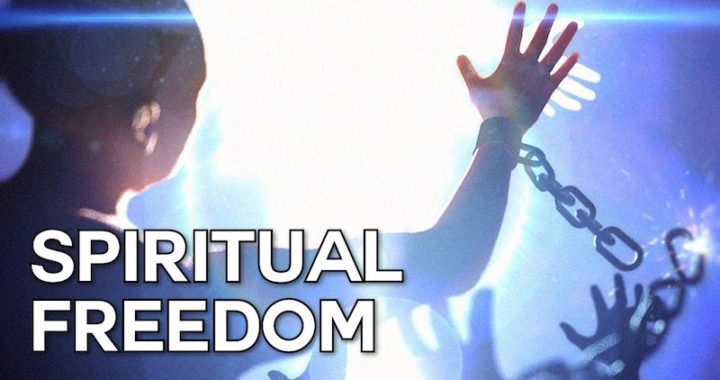What does it mean to walk in genuine spiritual freedom?
In a recent conversation with a friend, I was shocked to hear him identify with the community of believers in Yeshua (often called “the church”) because in the past he basically identified as an atheist who didn’t even acknowledge God. I was pleasantly surprised by his drastic change of position regarding faith in God but I was a little skeptical and I wanted to dig a bit deeper to try to understand how he came to this new place of faith.
As we continued our conversation, I asked him when this big change came about in his life. He responded that he was not exactly sure what I meant by this question. I explained to him that a few years back he identified as an atheist but now he is claiming to identify with the followers of Yeshua which obviously includes a belief in God and that I was curious when he had a change of heart. In his response he stated that he has come to respect several different people who believe strongly in Yeshua as the Messiah and in general he aligns himself with their beliefs and lifestyle.
The more we talked the more it became clear to me that he had not fully given his life to Yeshua as the Messiah but that he had come to a place of respecting those who have faith in Yeshua. He now enjoys identifying with the “club of believers” but he has not yet come to fully trust and believe in the Owner of the club!
Genuine Spiritual Freedom
In understanding the dark spiritual place from which my friend has come, it was encouraging to hear him speak positively about faith in God and in Yeshua as the Messiah, however, despite his getting closer to a place of faith in Yeshua he still has a long way to go. At this point in our conversation, my friend revealed to me that he did not see the need to completely embrace faith in the Messiah as his own. He simply no longer views followers of Yeshua as a cult and has made some “cool new friends” who are believers with whom he enjoys spending his time.
The mark of a true follower of God, according to the Bible, has never been limited to simply identifying with a certain group of people, but rather, it has always been about knowing God personally and walking with Him. A true believer acknowledges who God is and finds his or her identity in light of who He is. It is also a matter of worship. A true believer will worship God alone as revealed through the pages of the Bible. We see a good example of this in the weekly Torah Portion: Exodus 13:17-17:16.

Being Set Free
This week’s Torah Portion is called בשלח – Beshalach and literally means “…in sending (them) out…” or “…when he sent out…” and we find the context of this phrase in the first verse of this week’s reading:
Now when Pharaoh had let the people go, God did not lead them by the way of the land of the Philistines, even though it was near; for God said, “The people might change their minds when they see war, and return to Egypt.” – Exodus 13:17
The opening phrase of this verse in Hebrew is ויהי בשלח פרעה את העם – Veyahi Beshalach Paroh Et’ha’am and is literally translated as “And it happened when Pharaoh sent the people away,…” This phrase is also accurately translated as it is written in the full verse above, “Now when Pharaoh had let the people go,…” The Israelites were finally being let go or set free from Egypt.
The context of the verse quoted above is the reason the book of Exodus has been given its name: to record the account of the exodus from Egypt. God sent the ten plagues upon Pharaoh and the Egyptians in order to force Pharaoh to release the Israelites from slavery and bondage in Egypt. At the conclusion of the tenth plague, Pharaoh and the Egyptians finally had enough and Pharaoh ordered the Israelites to leave the land of Egypt. It was in sending the people out of Egypt that they were literally set free.
A Nation is Born
The people’s release from Egypt was not just a release from slavery but it was also a day of redemption. The tenth and final plague was the death of the firstborn males in all of Egypt, however, the Israelites were redeemed from this plague by the sacrificial blood of the lamb which was applied to the door posts of their homes:
Then all the sons of Israel did so; they did just as the LORD had commanded Moses and Aaron. And on that same day the LORD brought the sons of Israel out of the land of Egypt by their hosts. – Ex. 12:50-51
It was this act of obedience to the command of the LORD that brought about their redemption by the blood of the lamb and marked the day when the children of Israel were released from slavery and from the land of Egypt. The children of Israel entered Egypt as a family of brothers with their aged father Jacob consisting of seventy people (Ex. 1:1-7) but they left Egypt in great numbers as a nation and as the people of God.
The LORD had shown His power before the eyes of the Israelites with each plague that He had brought upon the Egyptians through His servant Moses. The LORD continued to reveal His power and presence to the Israelites as He led them out of Egypt and toward the Promised Land:
Then they set out from Succoth and camped in Etham on the edge of the wilderness. The LORD was going before them in a pillar of cloud by day to lead them on the way, and in a pillar of fire by night to give them light, that they might travel by day and by night. He did not take away the pillar of cloud by day, nor the pillar of fire by night, from before the people. – Exodus 13:20-22
Although Moses was leading the people, God’s power and presence was being displayed before the eyes of the people day and night. God’s presence was always with them.
It was in those first hours of being set free and having a new identity as the nation of Israel that the people were tested to trust in the LORD who had redeemed them from Egypt. The LORD had purposely brought the children of Israel to the edge of the sea and had hardened Pharaoh’s heart so that he would pursue them and appear to trap the Israelites between his army and the sea:
As Pharaoh drew near, the sons of Israel looked, and behold, the Egyptians were marching after them, and they became very frightened; so the sons of Israel cried out to the LORD. Then they said to Moses, “Is it because there were no graves in Egypt that you have taken us away to die in the wilderness? Why have you dealt with us in this way, bringing us out of Egypt? Is this not the word that we spoke to you in Egypt, saying, ‘Leave us alone that we may serve the Egyptians’? For it would have been better for us to serve the Egyptians than to die in the wilderness.” – Ex. 14:10-12
The joy of release from slavery suddenly became overshadowed by a physical threat from the enemy with no feasible way of escape. The people quickly turned against Moses and lost their desire for their freedom as they longed for the days of serving the Egyptians.
To be part of the nation of Israel when they were being set free from Egypt was wonderful and amazing but when the nation faced its first challenge from the enemy it suddenly did not seem so wonderful. The immediate response of the Israelites was to remember the “glorious days of old” when they served the Egyptians. If the choice was death in the desert or life as slaves in Egypt, they would rather return to being slaves. At that moment when Pharaoh and his army surrounded the Israelites, they forgot who they were and who it was who was leading them in the pillar of fire by night and in the cloud by day.
A Choice of Who We Serve
When the Israelites told Moses “…For it would have been better for us to serve the Egyptians than to die in the wilderness…” it is worth noting that the word for “serve” in this phrase is the Hebrew word עבד – Avad which is a verb that can mean to serve or to worship. Depending on the context, this Hebrew verb can carry either meaning. The consistent word play in the Hebrew language throughout the book of Exodus is a continual call for the Israelites to be set free to serve and worship (לעבוד – La’avod) the LORD rather than to serve (לעבוד – La’avod) Pharaoh and the Egyptians. It was a choice of masters and a choice of kingdoms.
We see this call of God for Moses and the Israelites to worship Him early on in the book of Exodus when the LORD first called Moses during the burning bush scenario:
“…Therefore, come now, and I will send you to Pharaoh, so that you may bring My people, the sons of Israel, out of Egypt.” But Moses said to God, “Who am I, that I should go to Pharaoh, and that I should bring the sons of Israel out of Egypt?” And He said, “Certainly I will be with you, and this shall be the sign to you that it is I who have sent you: when you have brought the people out of Egypt, you shall worship God at this mountain.” – Ex. 3:10-12
The LORD told Moses that he would worship God at this mountain. The word for worship here is the same root word as above, (לעבוד – La’avod). All throughout the first few chapters of Exodus we see the repeated call of Moses to demand that Pharaoh let the people go to worship (serve) the LORD:
Then the LORD said to Moses, “Pharaoh’s heart is stubborn; he refuses to let the people go. Go to Pharaoh in the morning as he is going out to the water, and station yourself to meet him on the bank of the Nile; and you shall take in your hand the staff that was turned into a serpent. You shall say to him, ‘The LORD, the God of the Hebrews, sent me to you, saying, “Let My people go, that they may serve Me in the wilderness. But behold, you have not listened until now.” – Ex. 7:14-16
The word for “serve” in verse sixteen is the Hebrew word לעבוד – La’avod – to serve or worship. God was calling out His people Israel from a place of slavery and servitude to Pharaoh and the Egyptians to become His people in order to serve Him alone!
To serve the LORD is to worship Him and to deny all others that place of primacy. After the Israelites had been set free from Egypt, many still served Pharaoh and the Egyptians in their hearts. They had not yet fully come to trust the LORD and to serve Him alone. It is never enough to simply be part of a group that identifies with the God of the Bible, we must always choose to serve and worship Him alone with our lives.
Walking in True Freedom
When the Israelites walked out of Egypt on that first Passover day 3500 years ago, they were set free from serving Pharaoh and the Egyptians. True freedom, however, was not simply found in ceasing to serve Pharaoh and the Egyptians but choosing to serve and worship the LORD.
We know that that majority of the Israelites who came out of Egypt did not please the LORD with their lives and never walked in true freedom. Most of them constantly looked back to Egypt and did not choose to serve the LORD alone. In the New Testament we read the following words:
For I do not want you to be unaware, brethren, that our fathers were all under the cloud and all passed through the sea; and all were baptized into Moses in the cloud and in the sea; and all ate the same spiritual food; and all drank the same spiritual drink, for they were drinking from a spiritual rock which followed them; and the rock was Messiah. Nevertheless, with most of them God was not well-pleased; for they were laid low in the wilderness. – 1 Corinthians 10:1-5
It is never enough to simply identify with a community of people who are called by God’s name. Each one of us must choose to serve and worship the God of Abraham, Isaac, and Jacob. Just as it was not good enough to simply be an Israelite in the time of Moses, so it not enough to simply identify with a religious group today and be called a Jew or a Christian. We must individually choose to believe in Yeshua as the Messiah whom God sent for each one of us.

When Yeshua walked this earth, He clearly taught that real freedom is only found in the truth of who He is. While talking to some fellow Jews at that time, He challenged their confidence in being descendants of Abraham:
So Yeshua was saying to those Jews who had believed Him, “If you continue in My word, then you are truly disciples of Mine; and you will know the truth, and the truth will make you free.” They answered Him, “We are Abraham’s descendants and have never yet been enslaved to anyone; how is it that You say, ‘You will become free’?” Yeshua answered them, “Truly, truly, I say to you, everyone who commits sin is the slave of sin. The slave does not remain in the house forever; the son does remain forever. So if the Son makes you free, you will be free indeed. – John 8:31-36
Many of the Jews who were talking to Yeshua at that time did not understand that they were slaves to sin and needed to be set free by the truth that Yeshua was bringing to them.
Genuine Spiritual Freedom
A person’s faith in God can never simply depend on one’s ancestors or in belonging to a certain faith group. Each person must come to a realization that sin is a real master, we are only free from sin through faith in the Son of God, and that true freedom is only found in serving Yeshua! This is what it means to walk in genuine spiritual freedom!
Shabbat Shalom!
If you enjoyed reading this article, share it today with friends! We also invite you to sign up for our weekly Torah Portion commentary on the sidebar to the right.
Help keep our weekly commentaries free and available to all. Click here to donate today:
*All Scripture take from NASB Copyright © 1960, 1962, 1963, 1968, 1971, 1972, 1973, 1975, 1977, 1995 by The Lockman Foundation
**The Hebrew name “Yeshua” is used in the biblical quotations in place of the English name “Jesus” to give emphasis to the meaning of this name, salvation. The word “Messiah” is also used in place of the word “Christ” to bring clarity to the office of Yeshua.


